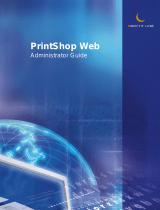
MIXED MEDIA
10
To use Mixed Media in Command WorkStation, your downloaded file must be a non-raster
file. To remove raster information from a file in Command WorkStation, right-click the file
and select Remove Raster Data.
You can duplicate this workflow with a PostScript file instead of a PDF. You can also specify
inserting tabs. For example, instead of specifying heavy media for the chapter dividers, you
can specify tabs and print chapter numbers on each tab. For more information about printing
with tabs, see
Utilities
.
3
The operator selects the job in Command WorkStation,
chooses Properties from the Actions menu, clicks the Media
icon in the Job Properties toolbar, and scrolls down to Mixed
Media. The operator applies the following settings:
a)
From New Page Range, the operator types
2
,
32
,
64
,
98,
124 for the page range (the pages that divide the chapters),
specifies a heavy media, and then indicates which tray
contains the heavy media.
b) From New Insert, the operator specifies inserting a blank
page after the last page to distinguish the end of the print
job and clicks OK.
c) From Define Cover, the operator specifies front and back
covers that print on front only, cover stock, and the tray to
pull media from.
d) From Layout, the operator specifies duplex, clicks OK,
and then saves the file.
Utilities
4
The operator processes and holds the job. Command WorkStation Help
5
The operator previews the job. Command WorkStation Help
6
The operator prints the job.
NOTE: The operator can also print one set as a proof
before printing multiple copies.
Command WorkStation Help
7
The operator retrieves the job from the digital press.
8
The job is printed with a front and back cover and
dividers for each chapter.
Step Task For more information





















